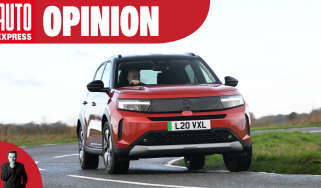What is Conditional Sale car finance and how does it work?
It might not be the most common kind of car finance but a Conditional Sale (CS) deal can suit some buyers very well

When buying a car, Conditional Sale (CS) car finance might be offered by the finance provider or dealer as a way of paying for your new motor.
Conditional Sale (CS) might not be as common as other other car finance options like Personal Contract Purchase (PCP) or Hire Purchase (HP) agreements, but CS car finance is just another way of spreading the cost of buying a car, if you want to own it at the end of the contract.
Like any form of car finance agreement, it’s really important that you know what you’re signing up to, so here’s our guide to Conditional Sale.
What is Conditional Sale car finance?
Conditional Sale car finance is similar to Hire Purchase because it lets you pay an initial deposit and then monthly instalments to cover the cost of buying a new or used car.
CS car finance is essentially a loan from a finance company to pay the dealer for the car and you then pay back the finance provider in monthly instalments. This will include interest.
One of the key benefits of Conditional Sale car finance is that it can be more flexible than some Hire Purchase or Personal Contract Purchase agreements, as these tend to be available only on cars under five years old.
So if you’re looking to buy an older used car which may not qualify for HP or PCP finance, a Conditional Sale agreement could be a great alternative to a bank loan.
How does Conditional Sale car finance work?
Conditional Sale car finance offers an affordable way to pay for a car you want to own outright at the end of the deal.
Similar to a Hire Purchase agreement, these deals usually run for between one and five years depending on how much you want to repay each month.
Pay a deposit
You pay an initial deposit at the start of the CS deal and decide how long you would like the agreement to run for. The deposit is typically 10 per cent of the overall value, but you can pay more or less, which will be reflected in the cost of your monthly payments.
A bigger deposit will lower your monthly payments, while a smaller deposit means higher monthly costs.
Pay the monthly instalments
Once you’ve paid the initial deposit and confirmed how long you would like the contract to run, you simply pay the agreed monthly instalment until the deal is finished.
What happens at the end of the agreement?
Unlike PCP agreements, CS deals don’t have any additional costs, fees or balloon payments at the end of the contract. At the end of the agreement, you will become the legal owner and will receive confirmation from the finance provider that you have no outstanding payments on the car.

Advantages of Conditional Sale car finance
Like any finance agreement, there are both advantages and disadvantages to CS. Before you sign on the dotted line, just make sure you fully understand all the terms and conditions.
Flexibility
One of the biggest advantages of Conditional Sale car finance is the flexibility it can give you.
Conditional Sale car finance agreements are generally more flexible than PCP deals, allowing you to spread the cost of buying a car by up to 60 months from the start date. Most PCP deals are limited to a maximum of 48 months. This means that you can lower your monthly payments by paying the deal off over a longer period, though this will ultimately cost you more due to interest payments to the finance provider.
You own the car at the end of the agreement
Another benefit of CS finance is there is no “option to purchase” fee at the end of the deal as there is with Hire Purchase agreements. As a result, there are no extra or hidden cost
No mileage limits
Unlike car leasing deals or PCP deals, Conditional Sale car finance agreements have no mileage limit, so you can drive as many miles as you like without worrying about a mileage cap or additional fees.
Disadvantages of Conditional Sale car finance
Similar to PCP and HP deals, a downside of a CS deal is you don’t own the car until the end of the deal, though you are the registered keeper and responsible for road tax, insurance, and the MoT if needed.
Monthly payments with a CS are often higher than a Personal Contract Purchase deal as you are paying off the full value of the car. You must also keep up the payments or risk the car being repossessed by the finance provider and you getting a poor credit rating.
Conditional Sale (CS) vs Hire Purchase (HP)
A Conditional Sale car finance deal and Hire Purchase agreement are very similar in how you repay the agreement, but there is a stark difference between the two finance options.
With a CS deal, you are registered keeper of the car from the very start of the deal and then own it outright at the end of the repayment term. However, with HP you need to pay a fee called an “option to purchase” to own the car and this can be included in the final payment.
Frequently Asked Questions
Yes. You can make larger monthly payments to settle the outstanding balance sooner, which is known as “partial early settlement.” Or you could pay a large lump sum to pay off the entire balance, which is called “early settlement”. You will need to ask the finance company for a “settlement figure” to know how much this will cost you.
If you decide to end the contract early, this is called “voluntary termination” and you will have to hand back the car. If you have paid less than half the total amount payable for the car including deposit, you will have to continue paying until you make the halfway amount. This will be marked on your credit file for other lenders to see and will be taken into consideration in future lending decisions.
Did you know you can sell your car with Auto Express? Get the highest bid from our network of over 5,500 dealers and we'll do the rest. Click here to try Auto Express Sell My Car now...








